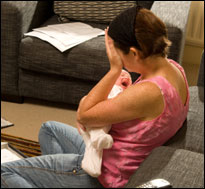The challenges of parenthood are only exacerbated for a family with limited financial resources. One common assumption about families living under conditions of poverty is that parents are more prone to psychiatric disorders; this may then negatively impact the development of children. However, researchers are calling into question such assumptions and whether these dynamics are even properly defined and understood. Indeed, rates of mental illness — in particular, generalized anxiety disorder (GAD) — among this population may be exaggerated.
A 2012 study from Rutgers published in the Journal of Child and Adolescent Social Work, “Is It Generalized Anxiety Disorder or Poverty? An Examination of Poor Mothers and Their Children,” analyzed data relating to a sample of 5,000 families from the Fragile Families and Child Wellbeing Study. One key question is whether or not broader definitions under the standard Diagnostic and Statistical Manual of Mental Disorders (DSM) have resulted in improper categorization of poor mothers as suffering from psychiatric conditions.
The study’s findings include:
- There was a positive correlation between poverty and generalized anxiety disorder. The conditions of poverty were associated with a higher likelihood of anxiety: “Mothers who had problems paying their utilities had a 2.44 [percentage point] odds of being in the General Anxiety Disorder (GAD) group.”
- Another measure of the association between poverty and anxiety was that “the mothers who had to move in with others had a 1.90 [percentage point] odds of being in the GAD group.”
- The increased likelihood of anxiety had negative impact on their parenting: “Maternal parenting stress was positively associated with punitive parenting by 21.7 percentage points.”
- Another negative impact for children was that “parenting stress was positively associated with both children’s being withdrawn by 4.5 percentage points and anxious/depressed symptoms by 3.4 percentage points.”
The researchers conclude that their “findings suggest that anxiety in poor mothers is usually not psychiatric, but a reaction to severe environmental deficits.” The study ultimately shows that the “path from anxiety to parenting stress was not supported. This suggests that mothers can be poor and anxious, but still provide positive parenting for their children. Nonetheless the picture is complicated as the path from stress to negative parenting was supported. This finding also has implications for practice. It suggests that in addition to concrete support, poor mothers may benefit from interventions designed to increase their capacity for coping with stress in addition to training in positive parenting skills.”
In related research, a 2011 study from the University of Wisconsin-Madison and Harvard University found significant differences in brain development among low-income children as compared with their higher income peers.
Tags: parenting, mental health, children


Expert Commentary